小学英语语法知识点及习题
(完整版)人教版小学英语语法知识点汇总
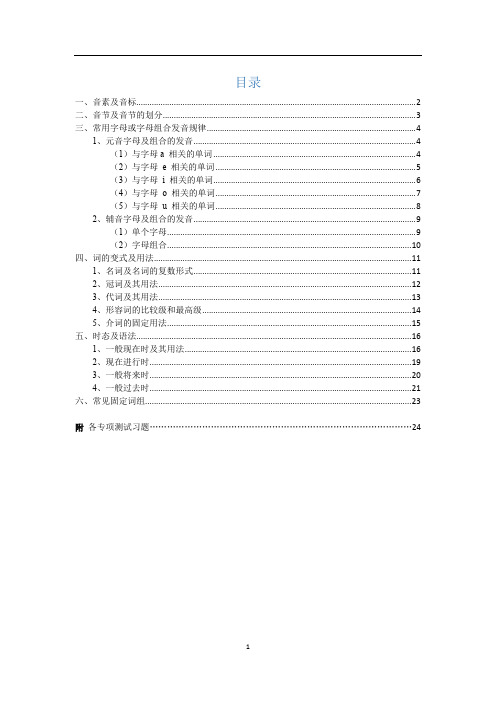
目录一、音素及音标 (2)二、音节及音节的划分 (3)三、常用字母或字母组合发音规律 (4)1、元音字母及组合的发音 (4)(1)与字母a 相关的单词 (4)(2)与字母 e 相关的单词 (5)(3)与字母i 相关的单词 (6)(4)与字母o 相关的单词 (7)(5)与字母u 相关的单词 (8)2、辅音字母及组合的发音 (9)(1)单个字母 (9)(2)字母组合 (10)四、词的变式及用法 (11)1、名词及名词的复数形式 (11)2、冠词及其用法 (12)3、代词及其用法 (13)4、形容词的比较级和最高级 (14)5、介词的固定用法 (15)五、时态及语法 (16)1、一般现在时及其用法 (16)2、现在进行时 (19)3、一般将来时 (20)4、一般过去时 (21)六、常见固定词组 (23)附各专项测试习题 (24)一、音素及音标音素:英语把组成一个读音的最小单位叫音素。
因素分为元音和辅音(相当于语文中的韵母和声母)1、元音(韵母)1.1发音方式:靠声带发音,有声调,气流通过喉头、口腔不受阻碍。
1.2举例:元音单元音长元音[a:][ә:][i:][ɔ:][u:]短元音[Λ][ә][i][ɔ][u][æ][e]双元音[ai][ei][ɔi][iә ][eә ][uә ][au][әu]1.3元音的结构元音的常见构成有:组合方式举例1单个元音字母D o g2元音字母+元音字母S ee、s ea、m ea t、b oo k3元音字母+辅音字母T al l、pl ay1.4元音字母共有5个,分别是:a e i o u2、辅音(声母)2.1发音方式:主要是用气流与牙齿舌头等其它器官摩擦发音,气流通过喉头、口腔要受到某个部位的阻碍。
2.2举例:辅音10对清辅音[p] [t] [k] [f] [s] [∫][t∫][tr] [θ][ts]浊辅音[b] [d] [g] [v] [z] [ʒ][dʒ][dr] [ð] [dz] 3个鼻音[m] [n] [η]3个似拼音[h] [r] [l]2个半元音[w] [j]2.3辅音的结构组合方式举例1单个辅音字母D og、b ook2辅音字母+辅音字tr ee、dr aw、tea ch、sh ip 2.4辅音字母26个字母中,除去5个元音字母(a、e、i、o、u),其他字母都是辅音字母。
小学英语语法汇总,含练习题及答案2020.10
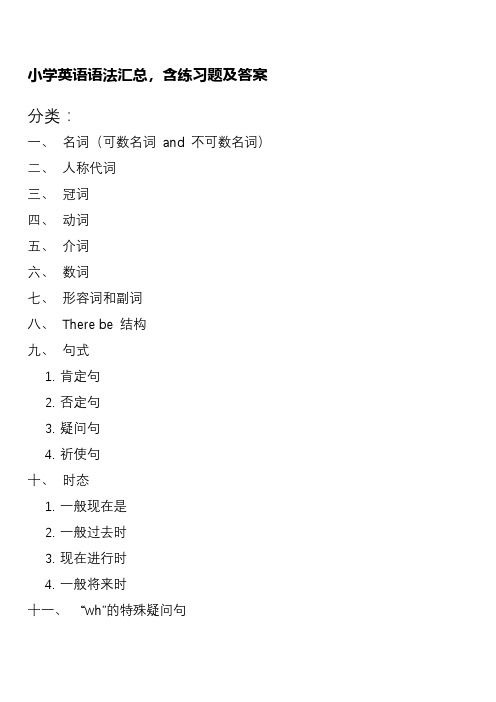
小学英语语法汇总,含练习题及答案分类:一、名词(可数名词and 不可数名词)二、人称代词三、冠词四、动词五、介词六、数词七、形容词和副词八、There be 结构九、句式1.肯定句2.否定句3.疑问句4.祈使句十、时态1.一般现在是2.一般过去时3.现在进行时4.一般将来时十一、“wh”的特殊疑问句一、 名词(表示任何事物的名称)专有名词:1.特定的人、地方、机构等专有名称。
第一个字母通常要大写。
(e.g. Toby 、Shanghai,Bank of China.)2.星期、月份、节日、学科、报刊名称也属于专有名词。
普通名词:1.个体名词----表示某类人或东西中的个体。
如(student 、 desk )2.集体名词----表示若干个体组成的结合体。
如(class 、 family )3.物质名词----表示无法分为个体的物质名词。
如(water 、 rice 、 sand 、 hair )4.抽象名词----表示情感、状态、品质等抽象名词。
如(love 、carelessness )个体名词和集体名词多数可以 用数目来计算,称为可数名词,有单数、复数形式 物质名词和抽象名词通常无法用数目计算,称为不可数名词,一般只有一种形式。
1.由元音字母的变化构成:man-men/ tooth-teeth/ foot-feet/ mouse-mice/ woman-women2.单复数形式一样的名词:sheep / deer / fish (也可以fishes)3.有些名词变成复数时加-en: child-children /ox-oxenPractices:1.peach2.zoo3. glass4.foxdy6. Policewoman7. house8.photo 9. monkey 10. wife11.rose 12. path 13. judge 14.map二、人称代词主格一般用在句子前面,宾格用在动词后面,I am Li Le. Call me le le.形容词性人称代词指“某人的什么”,my book(我的书),your puppy.(你的小狗)名词性人称代词指什么是“某人的”,This book is mime(这本书是我的)Practices:1.He (他)is my brother .2.I had a letter from her(她).3.It’s all right; it’s only me(我)4.Today we (我们)went in our(我们的)car;tomorrow we(我们) are going in theirs(他们的)5.I(我)lend my(我的)books gladly to my(我的)friends and to yours(你的).6.Can you help me (我)with my (我的)English?7.When you(你)go to see your(你的)father, please take these books to him(他)。
小学英语六年级总复习语法及练习题一
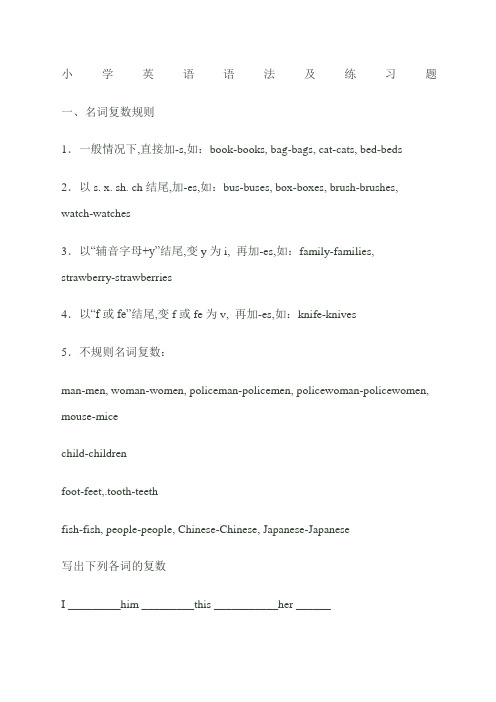
小学英语语法及练习题一、名词复数规则1.一般情况下,直接加-s,如:book-books, bag-bags, cat-cats, bed-beds 2.以s. x. sh. ch结尾,加-es,如:bus-buses, box-boxes, brush-brushes, watch-watches3.以“辅音字母+y”结尾,变y为i, 再加-es,如:family-families, strawberry-strawberries4.以“f或fe”结尾,变f或fe为v, 再加-es,如:knife-knives5.不规则名词复数:man-men, woman-women, policeman-policemen, policewoman-policewomen, mouse-micechild-childrenfoot-feet,.tooth-teethfish-fish, people-people, Chinese-Chinese, Japanese-Japanese写出下列各词的复数I _________him _________this ___________her ______watch _______child _______photo ________diary ______day________ foot________ book_______ dress ________tooth_______ sheep ______box_______ strawberry _____thief _______yo-yo ______ peach______ sandwich ______man______ woman_______ paper_______ juice___________water________ milk________ rice__________ tea__________二、一般现在时一般现在时基本用法介绍No. 1一般现在时的功能1.表示事物或人物的特征、状态;如:The sky is blue.天空是蓝色的;2.表示经常性或习惯性的动作;如:I get up at six every day.我每天六点起床;3.表示客观现实;如:The earth goes around the sun.地球绕着太阳转;一般现在时的构成1. be动词:主语+beam,is,are+其它;如:I am a boy.我是一个男孩;2.行为动词:主语+行为动词+其它;如:We study English.我们学习英语;当主语为第三人称单数he, she,it时,要在动词后加"-s"或"-es";如:Mary likes Chinese.玛丽喜欢汉语;一般现在时的变化1. be动词的变化;否定句:主语+ be + not +其它;如:He is not a worker.他不是工人;一般疑问句:Be +主语+其它;如:-Are you a student-Yes. I am. / No, I'm not.特殊疑问句:疑问词+一般疑问句;如:Where is my bike2.行为动词的变化;否定句:主语+ don't doesn't +动词原形+其它;如:I don't like bread.当主语为第三人称单数时,要用doesn't构成否定句;如:He doesn't often play.一般疑问句:Do Does +主语+动词原形+其它;如:- Do you often play football- Yes, I do. / No, I don't.当主语为第三人称单数时,要用does构成一般疑问句;如:- Does she go to work by bike- Yes, she does. / No, she doesn't.特殊疑问句:疑问词+一般疑问句;如:How does your father go to work 动词+s的变化规则1.一般情况下,直接加-s,如:cook-cooks, milk-milks2.以s. x. sh. ch. o结尾,加-es,如:guess-guesses, wash-washes,watch-watches, go-goes3.以“辅音字母+y”结尾,变y为i, 再加-es,如:study-studies一般现在时用法专练:一、写出下列动词的第三人称单数drink ________ go _______ stay ________ make ________look _________ have_______ pass_______ carry ____ come________ watch______ plant_______ fly ________ study_______ brush________ do_________ teach_______二、用括号内动词的适当形式填空;1. He often ________have dinner at home.2. Daniel and Tommy _______be in Class One.3. We _______not watch TV on Monday.4. Nick _______not go to the zoo on Sunday.5. ______ they ________like the World Cup6. What _______they often _______do on Saturdays7. _______ your parents _______read newspapers every day8. The girl _______teach us English on Sundays.9. She and I ________take a walk together every evening.10. There ________be some water in the bottle.11. Mike _______like cooking.12. They _______have the same hobby.13. My aunt _______look after her baby carefully.14. You always _______do your homework well.15. I _______be ill. I’m staying in bed.16. She _______go to school from Monday to Friday.17. Liu Tao _______do not like PE.18. The child often _______watch TV in the evening.19. Su Hai and Su Yang _______have eight lessons this term.20. -What day _______be it today-It’s Saturday.三、按照要求改写句子1. Daniel watches TV every evening.改为否定句___________________________________________________2. I do my homework every day.改为一般疑问句,作否定回答________________________________________________________ 3. She likes milk.改为一般疑问句,作肯定回答___________________________4. Amy likes playing computer games.改为一般疑问句,作否定回答___________________________________________________5. We go to school every morning.改为否定句_______________________________________________________ 6. He speaks English very well.改为否定句___________________________________________________7. I like taking photos in the park.对划线部分提问________________________________________________________ 8. John comes from Canada.对划线部分提问___________________________________________________9. She is always a good student.改为一般疑问句,作否定回答________________________________________________________ 10. Simon and Daniel like going skating.改为否定句___________________________________________________五、改错划出错误的地方,将正确的写在横线上1. Is your brother speak English __________________2. Does he likes going fishing __________________3. He likes play games after class. __________________4. Mr. Wu teachs us English. __________________5. She don’t do her homework on Sundays. _________________三、现在进行时1.现在进行时表示现在正在进行或发生的动作,也可表示当前一段时间内的活动或现阶段正在进行的动作;2.现在进行时的肯定句基本结构为be+动词ing.3.现在进行时的否定句在be后加not;4.现在进行时的一般疑问句把be动词调到句首;5.现在进行时的特殊疑问的基本结构为:疑问词不达意+ be + 主语+ 动词ing但疑问词当主语时其结构为:疑问词不达意+ be + 动词ing动词加ing的变化规则1.一般情况下,直接加ing,如:cook-cooking2.以不发音的e结尾,去e加ing,如:make-making, taste-tasting3.如果末尾是一个元音字母和一个辅音字母,双写末尾的辅音字母,再加ing,如:run-running, stop-stopping现在进行时专项练习:一、写出下列动词的现在分词:play________ run__________ swim _________make__________go_________ like________ write________ _ski___________read________ have_________ sing ________ dance_________put_________ see________ buy _________ love____________live_______ take_________ come ________ get_________stop_________ sit ________ begin________ shop___________二、用所给的动词的正确形式填空:1.The boy __________________ drawa picture now.2. Listen .Some girls _______________ singin the classroom .3. My mother _________________ cook some nice food now.4. What _____ you ______ do now5. Look . They _______________ have an English lesson .6.They ____________not ,water the flowers now.7.Look the girls ________________dance in the classroom .8.What is our granddaughter doing She _________listen to music.9. It’s 5 o’clock now. We _____________havesupper now10.______Helen____________wash clothes Yes ,she is .三、句型转换:1. They are doing housework .分别改成一般疑问句和否定句__________________________________________________________________________________________________________________________ 2.The students are cleaning the classroom . 改一般疑问句并作肯定和否定回答________________________________________________________________ _________________________________________________________________ _3.I’m playing the football in the playground .对划线部分进行提问________________________________________________________________ _4.Tom is reading books in his study . 对划线部分进行提问四、将来时理论及练习一、概念:表示将要发生的动作或存在的状态及打算、计划或准备做某事;句中一般有以下时间状语:tomorrow, next dayweek, month, year…,soon, the day after tomorrow后天等;二、基本结构:①be going to + do;②will+ do.三、否定句:在be动词am, is, arel后加not或情态动词will后加not成won’t;例如:I’m going to have a picnic this afternoon.→ I’m not going to have a picnic this afternoon.四、一般疑问句:be或will提到句首,some改为any, and改为or,第一二人称互换;例如:We are going to go on an outing this weekend. → Are you going to go on an outing this weekend五、对划线部分提问;一般情况,一般将来时的对划线部分有三种情况;1. 问人;Who 例如:I’m going to New York soon. →Who’s going to New York soon.2. 问干什么;What … do.例如:My father is going to watch a race with me thisafternoon. →What is your father going to do with you this afternoon.3. 问什么时候;When.例如:She’s going to go to bed at nine. →When is she goingto bed六、同义句:be going to = willI am going to go swimming tomorrow明天. = I will go swimming tomorrow. 练习:填空;1. 我打算明天和朋友去野炊;I_____ _______ _________ have a picnic with my friends.I ________ have a picnic with my friends.2. 下个星期一你打算去干嘛我想去打篮球;What ________ ________ _________ _________ _________ next Monday I _______ ______ _____ play basketball.What _________ you do next Monday I ________ play basketball.3. 你妈妈这个周末去购物吗是,她要去买一些水果;_____ your mother _______ ________ go shopping this ___________Yes, she _________. She ______ ________ __________ buy some fruit.4. 你们打算什么时候见面;What time _______ you _________ __________ meet改句子;5. Nancy is going to go camping.改否定Nancy ________ going to go camping.6. I’ll go and join them.改否定I _______ go ______ join them.7. I’m going to get up at 6:30 tomorrow.改一般疑问句________ _______ ________ to get up at 6:30 tomorrow8. We will meet at the bus stop at 10:30.改一般疑问句_______ ________ meet at the bus stop at 10:30.9. She is going to listen to music after school.对划线部分提问________ _______ she ________ ________ _________ after school10. My father and mother are going to see a play the day after tomorrow.同上_________ _________ going to see a play the day after tomorrow.用所给词的适当形式填空;11. Today is a sunny day. We ___________________ have a picnic this afternoon.12. My brother _______________ go to Shanghai next week.13. Tom often ______________go to school on foot. But today is rain. He ______________ go to school by bike.14. What do you usually do at weekends I usually __________ watch TV and ____________catch insects15. It’s Friday today. What _____she _________ do this weekend She ______________ watch TV and _____________ catch insects.16. What ___________ d0 you do last Sunday I ____________ pick apples on a farm. What ______________ do next Sunday I ______________ milk cows.17. Mary ____________ visit her grandparents tomorrow.18. Liu Tao ____________ fly kites in the playground yesterday.19. David ______________ give a puppet show next Monday.20. I ________________ plan for my study now五、一般过去时1.一般过去时表示过去某个时间发生的动作或存在的状态,常和表示过去的时间状语连用;一般过去时也表示过去经常或反复发生的动作感谢; 2.Be动词在一般过去时中的变化:⑴am 和is在一般过去时中变为was;was not=wasn’t⑵are在一般过去时中变为were;were not=weren’t⑶带有was或were的句子,其否定、疑问的变化和is, am, are一样,即否定句在was或were后加not,一般疑问句把was或were调到句首;3.句中没有be动词的一般过去时的句子否定句:didn’t +动词原形,如:Jim didn’t go home yesterday.一般疑问句:在句首加did,句子中的动词过去式变回原形;如:Did Jim go home yesterday特殊疑问句:⑴疑问词+did+主语+动词原形如:What did Jim do yesterday⑵疑问词当主语时:疑问词+动词过去式如:Who went to home yesterday动词过去式变化规则:1.一般在动词末尾加-ed,如:pull-pulled, cook-cooked2.结尾是e加d,如:taste-tasted3.末尾只有一个元音字母和一个辅音字母的重读闭音节,应双写末尾的辅音字母,再加-ed,如:stop-stopped4.以“辅音字母+y”结尾的,变y为i, 再加-ed,如:study-studied5.不规则动词过去式:am,is-was, are-were, do-did, see-saw, say-said, give-gave, get-got, go-went, come-came, have-had, eat-ate, take-took, run-ran, sing-sang, put-put,make-made, read-read, write-wrote, draw-drew, drink-drank, fly-flew, ride-rode, speak-spoke, sweep-swept, swim-swam, sit-sat过去时练习写出下列动词的过去式isam_________ fly_______ plant________ are ________drink_________ play_______ go________ make ________does_________ dance________ worry________ ask _____taste_________ eat__________ draw________ put ______throw________ kick_________ pass_______ do ________Be动词的过去时练习1Name ____________ No. ______ Date __________一、用be动词的适当形式填空1. I _______ at school just now.2. He ________ at the camp last week.3. We ________ students two years ago.4. They ________ on the farm a moment ago.5. Yang Ling ________ eleven years old last year.6. There ________ an apple on the plate yesterday.7. There ________ some milk in the fridge on Sunday.8. The mobile phone _______ on the sofa yesterday evening.二、句型转换1. It was exciting.否定句:________________________________________________ 一般疑问句:____________________________________________ 肯、否定回答:__________________________________________ 2. All the students were very excited.否定句:________________________________________________一般疑问句:____________________________________________ 肯、否定回答:__________________________________________ 3. They were in his pocket.否定句:________________________________________________ 一般疑问句:____________________________________________ 肯、否定回答:__________________________________________ Be动词的过去时练习2Name ____________ No. ______ Date __________一、用be动词的适当形式填空1. I ______ an English teacher now.2. She _______ happy yesterday.3. They _______ glad to see each other last month.4. Helen and Nancy ________ good friends.5. The little dog _____ two years old this year.6. Look, there ________ lots of grapes here.7. There ________ a sign on the chair on Monday..8. Today _____ the second of June. Yesterday ______ the first of June. It _____ Children’s Day. All the students ______ very excited.二、句型转换1. There was a car in front of the house just now.否定句:________________________________________________一般疑问句:____________________________________________肯、否定回答:__________________________________________肯、否定回答:__________________________________________三、中译英1.我的故事书刚才还在手表旁边;___________________________________________________________ 2.他们的外套上个礼拜放在卧室里了;___________________________________________________________ 3.一会以前花园里有两只小鸟;行为动词的过去时练习1Name ____________ No. ______ Date __________一、用行为动词的适当形式填空1. He _________ live in Wuxi two years ago.2. The cat ________ eat a bird last night.3. We _______ have a party last Halloween.4. Nancy ________ pick up oranges on the farm last week.5. I ________ make a model ship with Mike yesterday.6. They ________ play chess in the classroom last PE lesson.7. My mother _______ cook a nice food last Spring Festival.8. The girls ________ sing and _______ dance at the party.二、句型转换1. Su Hai took some photos at the Sports day.否定句:________________________________________________ 一般疑问句:____________________________________________ 肯、否定回答:__________________________________________2. Nancy went to school early.否定句:________________________________________________ 一般疑问句:____________________________________________ 肯、否定回答:__________________________________________ 3. We sang some English songs.否定句:________________________________________________ 一般疑问句:____________________________________________ 肯、否定回答:__________________________________________ 行为动词的过去时练习2Name ____________ No. ______ Date __________一、用be动词的适当形式填空1. I ______ watch a cartoon on Saturday.2. Her father _______ read a newspaper last night.3. We _________ to zoo yesterday, we _____ to the park. go4. ______ you _______ visit your relatives last Spring Festival5. ______ he _______ fly a kite on Sunday Yes, he ______.6. Gao Shan _______ pull up carrots last National Day holiday.7. I ____________ sweep the floor yesterday, but my mother ______.8. What ______ she _______ find in the garden last morning She __________ find a beautiful butterfly.二、句型转换1. They played football in the playground.否定句:________________________________________________一般疑问句:____________________________________________肯、否定回答:__________________________________________三、中译英1. 格林先生去年住在中国;________________________________________________________2. 昨天我们参观了农场;________________________________________________________3. 他刚才在找他的手机;________________________________________________________ 过去时综合练习1Name ____________ No. ______ Date __________一、用动词的适当形式填空1. It ______ be Ben’s birthday last Friday.2. We all ______ have a good time last night.3. He ________ jump high on last Sports Day.4. Helen ________ milk a cow on Friday.5. She likes ______ newspapers, but she ______ a book yesterday. read6. He _______ football now, but they _______ basketball just now. play7. Jim’s mother _________ plant trees just now.8. _______ they ________ sweep the floor on Sunday No, they _____.9. I _______ watch a cartoon on Monday.10. We ___________ go to school on Sunday.。
PEP小学英语语法要点及精选习题-答案
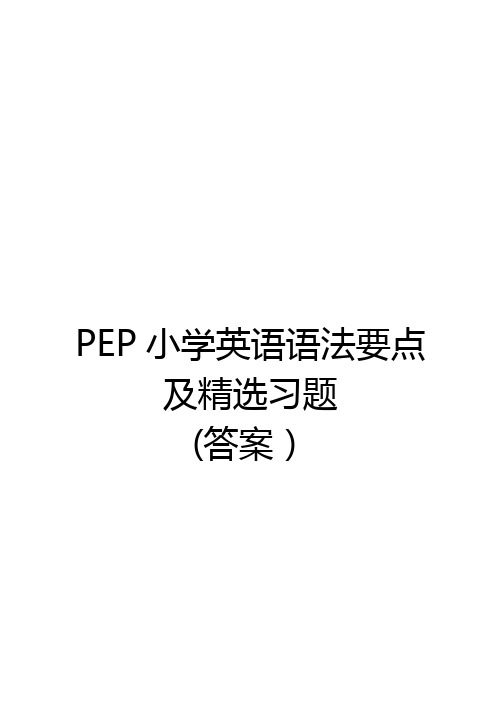
一、写出下列动词的现在分词:
play_playing_run__running__swim __swimming__make__making___
go___going___ski__skiing___
read_reading_have__having__sing __singing___dance_dancing__
3.What are you doingin the playground?
4.What isTomdoing in his study?
四、一般将来时
一、填空。
1。我打算明天和朋友去野炊。
Iamgoingtohave a picnic with my friends。
Iwillhave a picnic with my friends。
come - camehave - hadeat - atetake - took
run - ransing - sangput - putmake - made
read - readwrite - wrotedraw - drewdrink - drank
fly - flewride - rodespeak - spokesweep - swept
19. Davidwill givea puppet show next Monday.
20. Iis planningfor my study now
五、一般过去时
am,is - wasare - weredo - didsee - saw
say - saidgive - gaveget - gotgo - went
looklooksdrawdrawsdropdropsgivegives
完整版小学英语语法大全 .doc
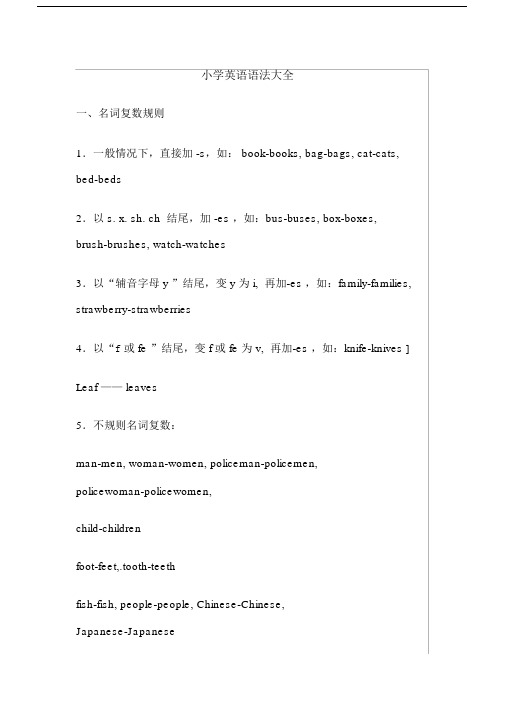
小学英语语法大全一、名词复数规则1.一般情况下,直接加 -s,如: book-books, bag-bags, cat-cats, bed-beds2.以 s. x. sh. ch 结尾,加 -es ,如:bus-buses, box-boxes,brush-brushes, watch-watches3.以“辅音字母 y ”结尾,变 y 为 i, 再加-es ,如:family-families, strawberry-strawberries4.以“f或 fe ”结尾,变 f 或 fe 为 v, 再加-es ,如:knife-knives ] Leaf —— leaves5.不规则名词复数:man-men, woman-women, policeman-policemen,policewoman-policewomen,child-childrenfoot-feet,.tooth-teethfish-fish, people-people, Chinese-Chinese,Japanese-Japanese写出下列各词的复数I _________him _________this ___________her ______watch _______child _______photo ________diary ______day________ foot________ book_______ dress ________tooth_______ sheep ______box_______ strawberry _____peach______ sandwich ______dish_______bus_______man______ woman_______二、一般现在时一般现在时基本用法介绍【No. 1 】一般现在时的功能1.表示事物或人物的特征、状态。
如:The sky is blue. 天空是蓝色的。
小学语法习题及答案
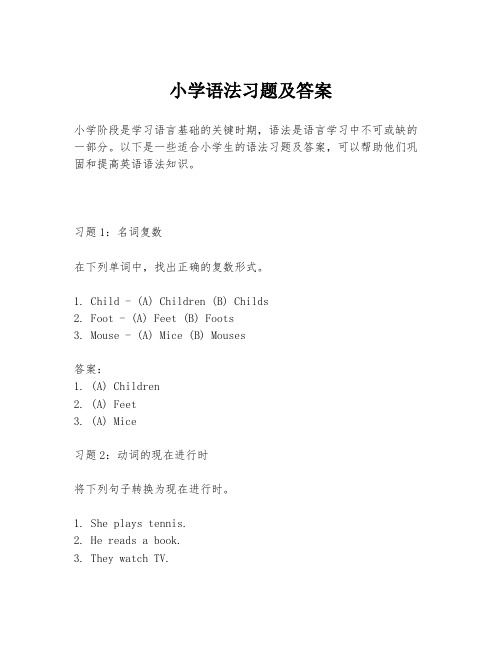
小学语法习题及答案小学阶段是学习语言基础的关键时期,语法是语言学习中不可或缺的一部分。
以下是一些适合小学生的语法习题及答案,可以帮助他们巩固和提高英语语法知识。
习题1:名词复数在下列单词中,找出正确的复数形式。
1. Child - (A) Children (B) Childs2. Foot - (A) Feet (B) Foots3. Mouse - (A) Mice (B) Mouses答案:1. (A) Children2. (A) Feet3. (A) Mice习题2:动词的现在进行时将下列句子转换为现在进行时。
1. She plays tennis.2. He reads a book.3. They watch TV.答案:1. She is playing tennis.2. He is reading a book.3. They are watching TV.习题3:一般过去时将下列句子转换为一般过去时。
1. I go to school every day.2. They play football in the park.3. She sings beautifully.答案:1. I went to school every day.2. They played football in the park.3. She sang beautifully.习题4:形容词比较级和最高级将下列句子中的形容词转换为比较级或最高级形式。
1. This apple is (big) than that one.2. She is the (tall) in her class.3. Of all the fruits, oranges are the (sweet).答案:1. This apple is bigger than that one.2. She is the tallest in her class.3. Of all the fruits, oranges are the sweetest.习题5:疑问句将下列陈述句转换为一般疑问句,并给出肯定和否定回答。
小学英语语法及习题
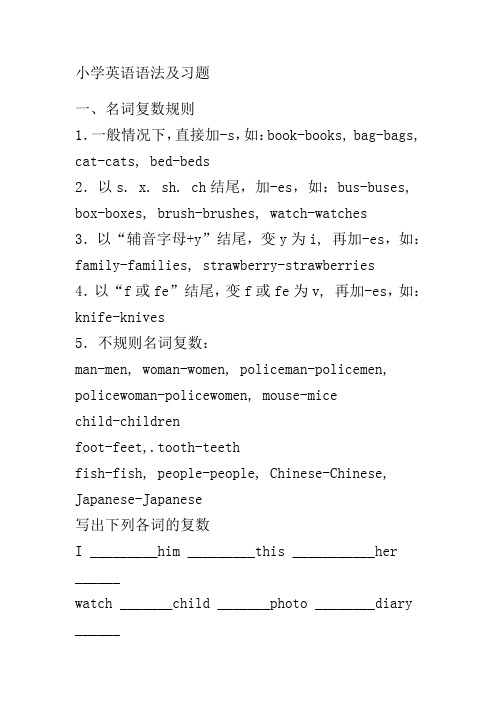
小学英语语法及习题一、名词复数规则1.一般情况下,直接加-s,如:book-books, bag-bags, cat-cats, bed-beds2.以s. x. sh. ch结尾,加-es,如:bus-buses, box-boxes, brush-brushes, watch-watches3.以“辅音字母+y”结尾,变y为i, 再加-es,如:family-families, strawberry-strawberries4.以“f或fe”结尾,变f或fe为v, 再加-es,如:knife-knives5.不规则名词复数:man-men, woman-women, policeman-policemen, policewoman-policewomen, mouse-micechild-childrenfoot-feet,.tooth-teethfish-fish, people-people, Chinese-Chinese, Japanese-Japanese写出下列各词的复数I _________him _________this ___________her______watch _______child _______photo ________diary ______day________ foot________ book_______ dress________tooth_______ sheep ______box_______ strawberry _____thief _______yo-yo ______ peach______ sandwich ______man______ woman_______paper_______ juice___________ water________ milk________ rice__________tea__________二、一般现在时一般现在时基本用法介绍【No. 1】一般现在时的功能1.表示事物或人物的特征、状态。
(完整版)小学英语语法及练习题
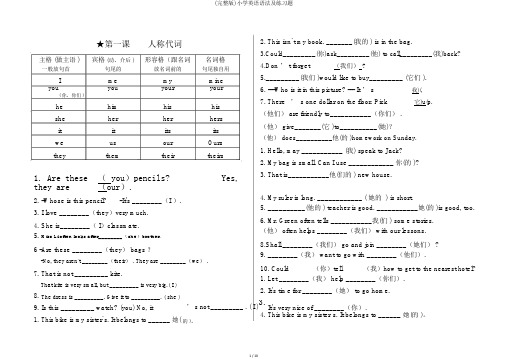
★第一课人称代词主格 (做主语 )宾格 (动、介后 )形容格(跟名词名词格一般放句首句尾的放名词前的句尾独自用I me my mine youyouyouryour ( 你,你们 )he him his his she her her hers it it its its weus our Ours theythemtheirtheirs1. Are these ( you )pencils? Yes,they are (our ).2. This isn`t my book. _______(我的 ) is in the bag.3.Could_________(你)ask_________(他) to call_________(我)back?4.Don ’ t forget (我们) ?5._________(我们 )would like to buy_________ (它们 ).6. ---Who is it in this picture? --- It ’ s 我)(.7. There ’ s one dollar on the floor. Pick它)u(p.(他们) are friendly to___________(你们) .(他) give_______(它 )to__________(她)?(他) does__________他(的 )homework on Sunday.1. Hello, may ___________ (我) speak to Jack?2. My bag is small. Can I use ____________ 你(的 )?3. That is___________他(们的 ) new house.2. -Whose is this pencil?-It's ________(I ).4. My ruler is long. ____________ ( 她的 ) is short.5. __________(他的 ) teacher is good. ___________她(的 )is good, too. 3. I love ________(they )very much.6. Mr. Green often tells ___________我(们 ) some stories. 4. She is________( I )classmate. (他) often helps ________(我们) with our lessons.5.Miss Li often looks after________(she )brother.6 -Are these ________(they ) bags ?8.Shall ________(我们) go and join ________(她们) ? 9. ________(我) want to go with ________(他们).-No, they aren't ________(their ) . They are ________(we ) .7. That is not _________ kite.10. Could(你)tell (我)how to get to the nearest hotel? 1. Let ________(我) help ________(你们). That kite is very small, but _________ is very big.( I )It's time for ________(她) to go home.8.2. The dress is _________. Give it to _________. ( she )9. Is this _________ watch? (you) No, it’ s not _________ . ( I )3.It's very nice of ________(你).1. This bike is my sister`s. It belongs to ______ 她( 4. This bike is my sister`s. It belongs to ______ 她(的 )。
小学英语语法知识点归纳
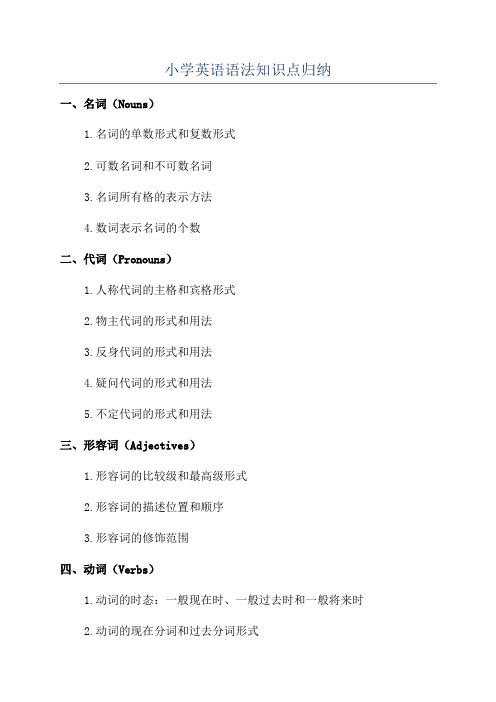
小学英语语法知识点归纳一、名词(Nouns)1.名词的单数形式和复数形式2.可数名词和不可数名词3.名词所有格的表示方法4.数词表示名词的个数二、代词(Pronouns)1.人称代词的主格和宾格形式2.物主代词的形式和用法3.反身代词的形式和用法4.疑问代词的形式和用法5.不定代词的形式和用法三、形容词(Adjectives)1.形容词的比较级和最高级形式2.形容词的描述位置和顺序3.形容词的修饰范围四、动词(Verbs)1.动词的时态:一般现在时、一般过去时和一般将来时2.动词的现在分词和过去分词形式3.一般现在时的特殊疑问句和否定句4.动词的被动语态5.动词的情态动词6.动词的非谓语形式:动名词和不定式五、副词(Adverbs)1.副词修饰动词、形容词和副词的用法2.频度副词的表示方法3.比较副词的形式和用法4.疑问副词的形式和用法六、介词(Prepositions)1. 常见介词的用法:in、on、under、behind等2.介词短语的表示方式七、连词(Conjunctions)1. 表示并列关系的连词:and、but、or等2. 表示选择关系的连词:either...or、neither...nor等3. 表示因果关系的连词:because、so等4. 表示转折关系的连词:however、although等八、数词(Numerals)1.基数词和序数词的用法2.几分之几的表达方式九、冠词(Articles)1. 定冠词(the)和不定冠词(a/an)的用法十、句子(Sentences)1.句子的主谓结构和宾语结构2.简单句、并列句、复合句的构成3.特殊疑问句的构成以上是小学英语语法的一些基本知识点归纳,但在学习英语语法的过程中还需要通过大量的实践和练习来掌握和运用这些知识点,并逐渐提高语法的准确性和流利度。
小学英语语法练习
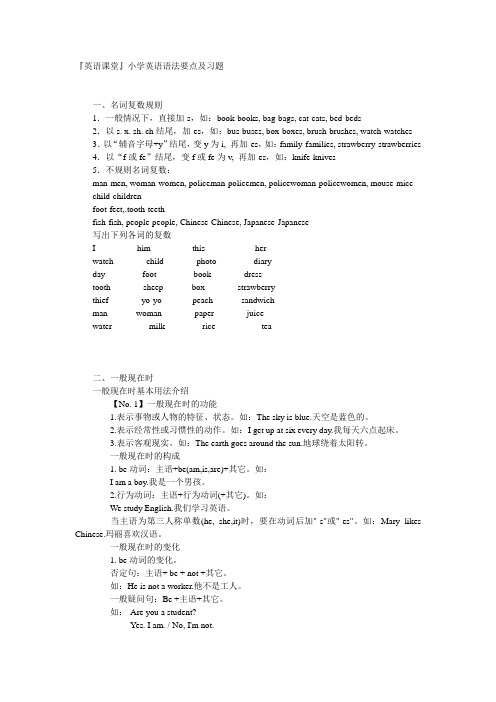
『英语课堂』小学英语语法要点及习题一、名词复数规则1.一般情况下,直接加-s,如:book-books, bag-bags, cat-cats, bed-beds2.以s. x. sh. ch结尾,加-es,如:bus-buses, box-boxes, brush-brushes, watch-watches 3.以“辅音字母+y”结尾,变y为i, 再加-es,如:family-families, strawberry-strawberries 4.以“f或fe”结尾,变f或fe为v, 再加-es,如:knife-knives5.不规则名词复数:man-men, woman-women, policeman-policemen, policewoman-policewomen, mouse-mice child-childrenfoot-feet,.tooth-teethfish-fish, people-people, Chinese-Chinese, Japanese-Japanese写出下列各词的复数I _________him _________this ___________her ______watch _______child _______photo ________diary ______day________ foot________ book_______ dress ________tooth_______ sheep ______box_______ strawberry _____thief _______yo-yo ______ peach______ sandwich ______man______ woman_______ paper_______ juice___________water________ milk________ rice__________ tea__________二、一般现在时一般现在时基本用法介绍【No. 1】一般现在时的功能1.表示事物或人物的特征、状态。
(完整版)小学英语语法大全-附练习题,推荐文档

小学英语语法大全-附练习题Contents第一章名词1.名词的数2.名词的格第二章代词1.人称代词2.物主代词第三章冠词与数词1.冠词2.数词第四章一般现在时态第五章现在进行时态第六章句型1.陈述句2.疑问句3.祈使句4.There be 句型与have\ has第七章总结考试第一章名词 (Noun )名词的概念在生活中,我们会接触到各种各样的人和事物,用来表示这些人或事物名称的词就是名词。
一、名词的数名词的数指名词的单数和复数形式。
可数名词表示“一个”时用单数, “两个以上”时用复数;不可数名词表示量时, 通常用“数词+单位+of+物质名词”的形式,如a piece of bread (一片面包),变monkey --- monkeys 5.以 3'结尾的名词,复数一般在词尾加“ s”,但个别加es”tomato --- tomatoes (西红柿) 词尾读音[z ]potato --- potatoes (土豆) zoo --- zoos (动物园) photo --- photos (照片)* (以 o"结尾,复数加 es”)口诀:黑人(Negro )英雄(hero ),左手拿着西红柿(tomato ),右手拿着破土豆(potato ), 头顶一个大芒果(mango )。
6.以f 或fe 结尾的词,多数变 leaf --- leaves (树叶) knife --- knives ( 小刀)*(以f 或fe 结尾的单词,需把 妻子(wife )持刀(knife )去宰 半(half )片树叶(leaf )遮目光。
*(以f 或fe 结尾的单词,直接加 s”的单词)口诀:长颈鹿(giraffe )站在屋檐(roof )下,左手拿着手绢(handkerchief ),右手拿着高尔夫球(golf )。
例:roof --- roofs (屋顶)7 .不规则名词复数的变化为复数时,只须将单位名词变为复数, *名词复数的构成法则1 . 一般情况下在词尾加 s. shop --- shops (商店) bag --- bags (书包) window --- windows ( 窗户)2 .以s, x, sh, ch 结尾的单词在词尾加 class --- classes 班级)box --- boxes (盒子) match --- matches(比赛) brush --- brushes (刷子)3 .以“辅音字母 +y”结尾的词, story --- stories (故事)4 .以“元音字母 +y” key --- keys如:two pieces of bread (两片面包)。
PEP小学六年级英语下册复习语法知识及配套习题
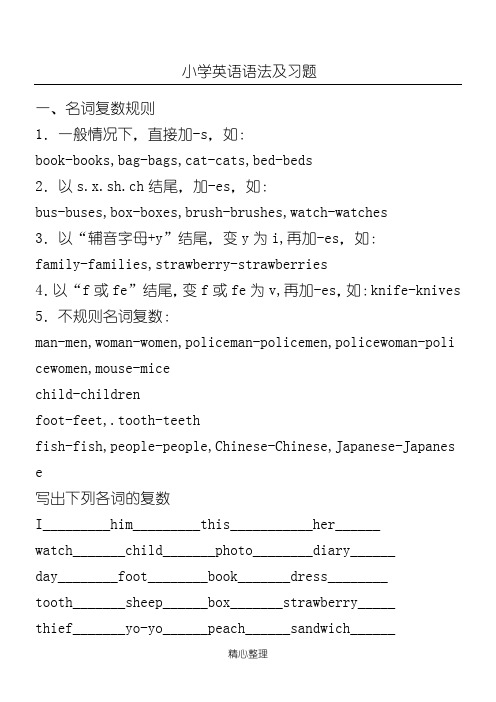
小学英语语法及习题一、名词复数规则1.一般情况下,直接加-s,如:book-books,bag-bags,cat-cats,bed-beds2.以s.x.sh.ch结尾,加-es,如:3.以4.以5eI_________him_________this___________her______ watch_______child_______photo________diary______ day________foot________book_______dress________ tooth_______sheep______box_______strawberry_____ thief_______yo-yo______peach______sandwich______man______woman_______paper_______??????juice___________ water________milk________rice__________tea__________ 二、一般现在时一般现在时基本用法介绍【No.1】一般现在时的功能或"-es"一般现在时的变化1.be动词的变化。
否定句:主语+be+not+其它。
如:Heisnotaworker.他不是工人。
一般疑问句:Be+主语+其它。
如:-Areyouastudent?-Yes.Iam./No,I'mnot.特殊疑问句:疑问词+一般疑问句。
如:Whereismybike?2.行为动词的变化。
否定句:主语+don't(doesn't)+动词原形(+其它)。
如:动词12.以s.x.sh.ch.o结尾,加-es,如:guess-guesses,wash-washes,watch-watches,go-goes3.以“辅音字母+y”结尾,变y为i,再加-es,如:study-studies 一般现在时用法专练:一、写出下列动词的第三人称单数drink________go_______stay________make________look_________have_______pass_______????carry____ come________?????watch______plant_______fly________ study_______brush________do_________????teach_______ 二、用括号内动词的适当形式填空。
小学英语语法及练习题
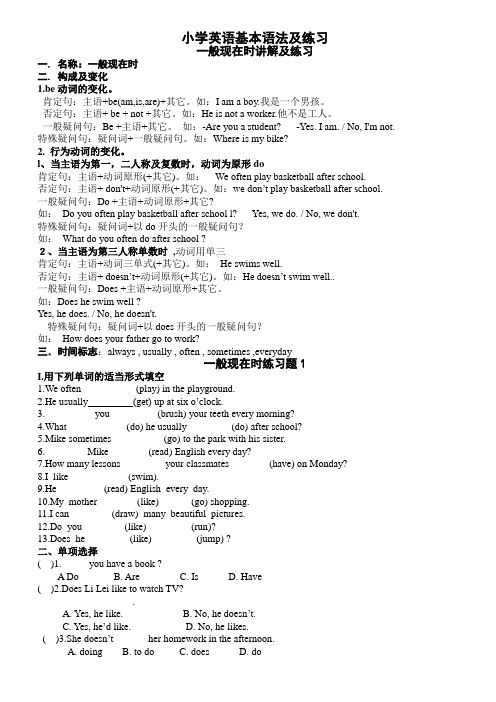
小学英语基本语法及练习一般现在时讲解及练习一. 名称:一般现在时二. 构成及变化1.be动词的变化。
肯定句:主语+be(am,is,are)+其它。
如:I am a boy.我是一个男孩。
否定句:主语+ be + not +其它。
如:He is not a worker.他不是工人。
一般疑问句:Be +主语+其它。
如:-Are you a student? -Yes. I am. / No, I'm not. 特殊疑问句:疑问词+一般疑问句。
如:Where is my bike?2. 行为动词的变化。
l、当主语为第一,二人称及复数时,动词为原形do肯定句:主语+动词原形(+其它)。
如:We often play basketball after school.否定句:主语+ don't+动词原形(+其它)。
如:we don’t play basketball after school.一般疑问句:Do +主语+动词原形+其它?如:Do you often play basketball after school l? Yes, we do. / No, we don't.特殊疑问句:疑问词+以do开头的一般疑问句?如:What do you often do after school ?2、当主语为第三人称单数时,动词用单三肯定句:主语+动词三单式(+其它)。
如:He swims well.否定句:主语+ doesn’t+动词原形(+其它)。
如:He doesn’t swim well..一般疑问句:Does +主语+动词原形+其它。
如:Does he swim well ?Yes, he does. / No, he doesn't.特殊疑问句:疑问词+以does开头的一般疑问句?如:How does your father go to work?三.时间标志:always , usually , often , sometimes ,everyday一般现在时练习题1I.用下列单词的适当形式填空1.We often___________(play) in the playground.2.He usually_________(get) up at six o’clock.3.__________you _________(brush) your teeth every morning?4.What____________(do) he usually_________(do) after school?5.Mike sometimes __________(go) to the park with his sister.6.________ Mike________(read) English every day?7.How many lessons_________your classmates________(have) on Monday?8.I like ___________ (swim).9.He _________(read) English every day.10.My mother________(like) ______(go) shopping.11.I can ________(draw) many beautiful pictures.12.Do you ________(like)_________(run)?13.Does he_________(like)_________(jump) ?二、单项选择( )1._____ you have a book ?A Do B. Are C. Is D. Have( )2.Does Li Lei like to watch TV?______________.A. Yes, he like.B. No, he doesn’t.C. Yes, he’d like.D. No, he likes.( )3.She doesn’t ______ her homework in the afternoon.A. doingB. to doC. doesD. do( )4.How ____ Mr. Smith ______ to England?A. do, goB. is , goC. does, goD. does , goes( )5. _____ she ______ home at six every day?A. Is , leaveB. Does , leaveC. Is , leavesD. Does , left三、按要求完成下列各题1.Tomorrow is Saturday.(变成一般疑问句)_________ ________ Saturday ?2.Does he play basketball every weekend? (肯定回答)Yes, ______ _______.3.She looks like her sister.(变一般疑问句)_____ she ______ like her sister ?4.Peter and Sam look the same.(一般疑问句)______ they _____ the same ?5.Do they always go to the movie (电影院) on Sundays ? (否定回答)No, _______ _______.现在进行时态精讲精练1.名称:现在进行时例:I am reading an English book now. 我现在正在读一本英语书。
PEP小学六年级英语下册复习语法知识及配套习题
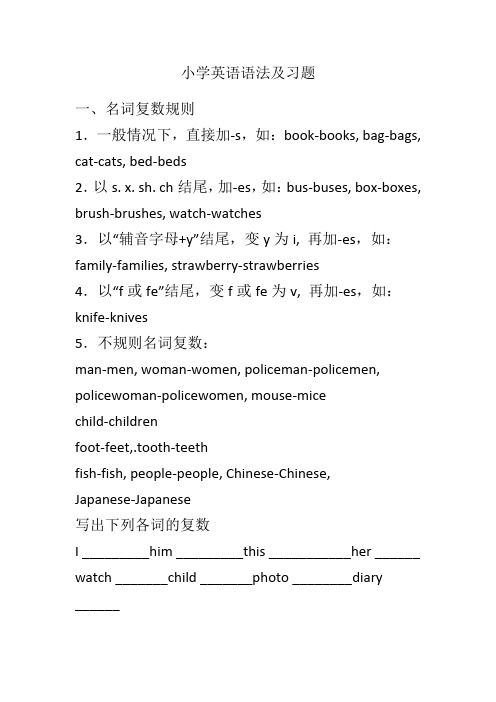
小学英语语法及习题一、名词复数规则1.一般情况下,直接加-s,如:book-books, bag-bags, cat-cats, bed-beds2.以s. x. sh. ch结尾,加-es,如:bus-buses, box-boxes, brush-brushes, watch-watches3.以“辅音字母+y”结尾,变y为i, 再加-es,如:family-families, strawberry-strawberries4.以“f或fe”结尾,变f或fe为v, 再加-es,如:knife-knives5.不规则名词复数:man-men, woman-women, policeman-policemen, policewoman-policewomen, mouse-micechild-childrenfoot-feet,.tooth-teethfish-fish, people-people, Chinese-Chinese,Japanese-Japanese写出下列各词的复数I _________him _________this ___________her ______ watch _______child _______photo ________diary______day________ foot________ book_______ dress________tooth_______ sheep ______box_______ strawberry_____thief _______yo-yo ______ peach______ sandwich______man______ woman_______paper_______ juice___________water________ milk________ rice__________tea__________二、一般现在时一般现在时基本用法介绍【No. 1】一般现在时的功能1.表示事物或人物的特征、状态。
小学英语语法复习题及答案
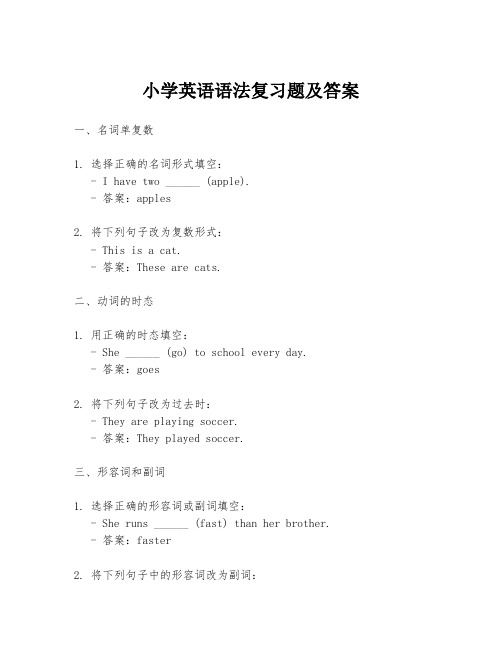
小学英语语法复习题及答案一、名词单复数1. 选择正确的名词形式填空:- I have two ______ (apple).- 答案:apples2. 将下列句子改为复数形式:- This is a cat.- 答案:These are cats.二、动词的时态1. 用正确的时态填空:- She ______ (go) to school every day.- 答案:goes2. 将下列句子改为过去时:- They are playing soccer.- 答案:They played soccer.三、形容词和副词1. 选择正确的形容词或副词填空:- She runs ______ (fast) than her brother.- 答案:faster2. 将下列句子中的形容词改为副词:- She is a beautiful girl.- 答案:She is beautifully dressed.四、代词1. 选择正确的代词填空:- That is ______ (he) book.- 答案:his2. 将下列句子中的名词改为相应的代词:- The boys are playing. They are having fun.- 答案:The boys are playing. They are having fun.五、疑问句1. 将下列陈述句改为一般疑问句,并给出肯定和否定回答: - She is a teacher.- 一般疑问句:Is she a teacher?- 肯定回答:Yes, she is.- 否定回答:No, she isn't.2. 用正确的疑问词填空:- ______ is your favorite color?- 答案:What六、连词1. 用正确的连词填空:- I will go to the park ______ it doesn't rain.- 答案:if2. 将下列句子用连词连接:- She can play the piano. She can also play the violin. - 答案:She can play the piano and she can also play the violin.七、介词1. 选择正确的介词填空:- The cat is ______ the box.- 答案:in2. 将下列句子中的介词短语改为正确的形式:- The book is under of the table.- 答案:The book is under the table.八、句型转换1. 将下列句子改为否定句:- They can speak English.- 答案:They can't speak English.2. 将下列句子改为被动语态:- The teacher will give us a test.- 答案:A test will be given to us by the teacher.结束语:希望这些复习题能帮助你巩固小学英语语法知识。
完整版)小学英语语法及练习题
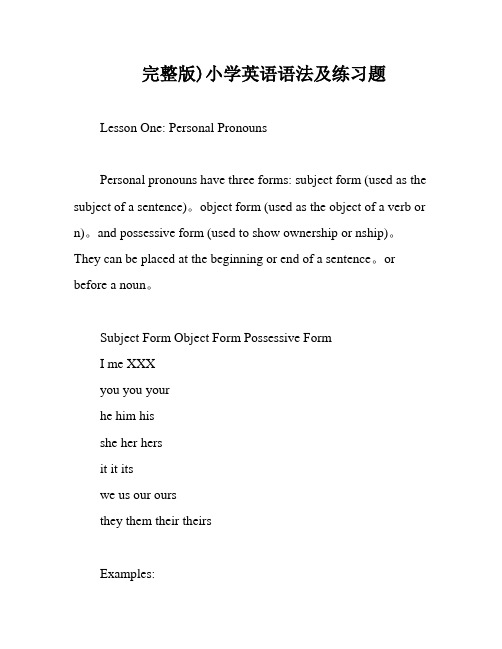
完整版)小学英语语法及练习题Lesson One: Personal PronounsPersonal pronouns have three forms: subject form (used as the subject of a sentence)。
object form (used as the object of a verb or n)。
and possessive form (used to show ownership or nship)。
They can be placed at the beginning or end of a sentence。
or before a noun。
Subject Form Object Form Possessive FormI me XXXyou you yourhe him hisshe her hersit it itswe us our oursthey them their theirsExamples:1.Are these your pencils。
Yes。
they are ours.2.Whose is this pencil。
It's XXX.3.I love them very much.4.XXX.5.Miss Li often looks after her XXX.6.Are these their bags。
No。
they XXX.7.That is not my kite。
That kite is very small。
but mine is very big.8.The dress is hers。
Give it to her.9.Is this your watch。
No。
it's not XXX.1.This bike is my sister's。
It belongs to her.2.This isn't my book。
(完整版)四年级英语小学英语语法及习题
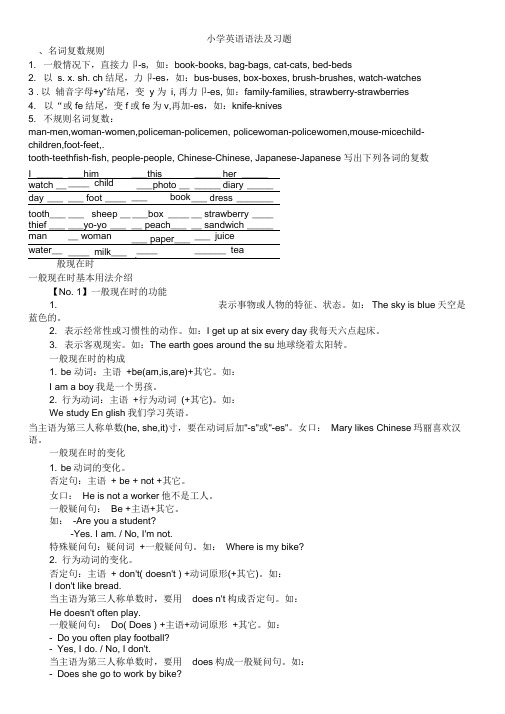
、名词复数规则1. 一般情况下,直接力卩-s, 如:book-books, bag-bags, cat-cats, bed-beds2. 以s. x. sh. ch结尾,力卩-es,如:bus-buses, box-boxes, brush-brushes, watch-watches3 .以辅音字母+y”结尾,变y 为i, 再力卩-es, 如:family-families, strawberry-strawberries4. 以“或fe结尾,变f或fe为v,再加-es,如:knife-knives5. 不规则名词复数:man-men,woman-women,policeman-policemen, policewoman-policewomen,mouse-micechild-children,foot-feet,.tooth-teethfish-fish, people-people, Chinese-Chinese, Japanese-Japanese 写出下列各词的复数般现在时一般现在时基本用法介绍【No. 1】一般现在时的功能1. 表示事物或人物的特征、状态。
如:The sky is blue天空是蓝色的。
2. 表示经常性或习惯性的动作。
如:I get up at six every day我每天六点起床。
3. 表示客观现实。
如:The earth goes around the su地球绕着太阳转。
一般现在时的构成1. be 动词:主语+be(am,is,are)+其它。
如:I am a boy我是一个男孩。
2. 行为动词:主语+行为动词(+其它)。
如:We study En glish我们学习英语。
当主语为第三人称单数(he, she,it)寸,要在动词后加"-s"或"-es"。
女口:Mary likes Chinese玛丽喜欢汉语。
一般现在时的变化1. be动词的变化。
- 1、下载文档前请自行甄别文档内容的完整性,平台不提供额外的编辑、内容补充、找答案等附加服务。
- 2、"仅部分预览"的文档,不可在线预览部分如存在完整性等问题,可反馈申请退款(可完整预览的文档不适用该条件!)。
- 3、如文档侵犯您的权益,请联系客服反馈,我们会尽快为您处理(人工客服工作时间:9:00-18:30)。
2017 小学英语语法知识点及习题整理前言:学习和记忆法全身心记忆法根据测试,参与记忆单词的器官和身体部位越多,单词在大脑中的印象就越深刻,记忆的时间也就越长。
边读边写边记,除读记所使用的发音器官和身体的其它部位外,大脑中枢还要指挥大臂带动小臂,小臂带动手掌,手掌带动手指,从而正确地书写单词。
这种方法避免了"小和尚念经",因为只要注意力不集中,书写马上就出错。
书写既是大脑中枢的执行行为,又是大脑中枢的监察器。
联系记忆法联系记忆法就是在记忆单词的过程中,不去孤立地记一个词或词组,而是把它与同义词、反义词、相关词、句、篇等联系起来记忆。
同义记忆与近义记忆掌握一个词或词组的同义词和近义词或者其解释是掌握该语言重要的一环。
只有这样,才能初步做到用英语进行思维,而用英语思维是掌握英语的一个标志。
同类记忆与比较记忆同类记忆的涵盖面很广,如词性同类、动物同类、植物同类、事情同类、物品同类等。
如我们可以把边际从属连词放在一起记忆。
比较记忆是把词形相近或意义相近的词放在一起对比记忆。
这样记忆可以辨别词义,准确使用词汇。
联想记忆"联想是钓钩,在茫茫的艺海中,它能准确地钩住你所识记的事物。
"联想越丰富,越多彩,记忆的艺术也就越高超。
记忆以联想为基础;联想又是记忆的一种方法。
联想又分为类似联想、类别联想和词、句、篇联想。
无意识记忆法无意识记忆并不是无注意力记忆,而是时间分散记忆。
这种方法特别适合于工作忙碌的人。
首先准备一个袖珍笔记本,将要记忆的单词写在笔记本上。
只要有时间就拿出来读读。
这些单词见多了对你就会产生感情,你一定能记住,因为每读记一遍,就在你的大脑中加深一层印象。
这样记忆的单词可长久不忘,并能随时想起,是一种很好的长时记忆法。
构词记忆法利用英语词汇的构词规律,内在结构记忆单词是一种理性地使自己词汇量膨胀起来的方法。
英语单词是由词素构成的,词素分为自由词素和粘附词素。
记忆单词主要是记自由词素,因为有些自由词素可以充当词根,词根加词缀构成许多派生词。
构词法主要有三种:转化、合成和派生。
语法规则整理一、名词复数规则1.一般情况下,直接加-s,如:book-books, bag-bags, cat-cats, bed-beds2.以s. x. sh. ch结尾,加-es,如:bus-buses, box-boxes, brush-brushes, watch-watches3.以“辅音字母+y”结尾,变y为i, 再加-es,如:family-families, strawberry-strawberries4.以“f或fe”结尾,变f或fe为v, 再加-es,如:knife-knives 5.不规则名词复数:man-men, woman-women, policeman-policemen, policewoman-policewomen, mouse-micechild-childrenfoot-feet,.tooth-teethfish-fish, people-people, Chinese-Chinese, Japanese-Japanese写出下列各词的复数I _________him _________this ___________her ______watch _______child _______photo ________diary ______day________ foot________ book_______ dress ________tooth_______ sheep ______box_______ strawberry _____thief _______yo-yo ______ peach______ sandwich ______man______ woman_______ paper_______ juice___________water________ milk________ rice__________ tea__________二、一般现在时一般现在时基本用法介绍【No. 1】一般现在时的功能1.表示事物或人物的特征、状态。
如:The sky is blue.天空是蓝色的。
2.表示经常性或习惯性的动作。
如:I get up at six every day.我每天六点起床。
3.表示客观现实。
如:The earth goes around the sun.地球绕着太阳转。
一般现在时的构成1. be动词:主语+be(am,is,are)+其它。
如:I am a boy.我是一个男孩。
2.行为动词:主语+行为动词(+其它)。
如:We study English.我们学习英语。
当主语为第三人称单数(he, she,it)时,要在动词后加"-s"或"-es"。
如:Mary likes Chinese.玛丽喜欢汉语。
一般现在时的变化1. be动词的变化。
否定句:主语+ be + not +其它。
如:He is not a worker.他不是工人。
一般疑问句:Be +主语+其它。
如:-Are you a student-Yes. I am. / No, I'm not.特殊疑问句:疑问词+一般疑问句。
如:Where is my bike?2.行为动词的变化。
否定句:主语+ don't( doesn't ) +动词原形(+其它)。
如:I don't like bread.当主语为第三人称单数时,要用doesn't构成否定句。
如:He doesn't often play.一般疑问句:Do( Does ) +主语+动词原形+其它。
如:- Do you often play football?- Yes, I do. / No, I don't.当主语为第三人称单数时,要用does构成一般疑问句。
如:- Does she go to work by bike?- Yes, she does. / No, she doesn't.特殊疑问句:疑问词+一般疑问句。
如:How does your father go to work?动词+s的变化规则1.一般情况下,直接加-s,如:cook-cooks, milk-milks2.以s. x. sh. ch. o结尾,加-es,如:guess-guesses, wash-washes, watch-watches, go-goes3.以“辅音字母+y”结尾,变y为i, 再加-es,如:study-studies 一般现在时用法专练:一、写出下列动词的第三人称单数drink ________ go _______ stay ________ make ________look _________ have_______ pass_______ carry ____ come________ watch______ plant_______ fly ________ study_______ brush________ do_________ teach_______二、用括号内动词的适当形式填空。
1. He often ________(have) dinner at home.2. Daniel and Tommy _______(be) in Class One.3. We _______(not watch) TV on Monday.4. Nick _______(not go) to the zoo on Sunday.5. ______ they ________(like) the World Cup?6. What _______they often _______(do) on Saturdays?7. _______ your parents _______(read) newspapers every day?8. The girl _______(teach) us English on Sundays.9. She and I ________(take) a walk together every evening.10. There ________(be) some water in the bottle.11. Mike _______(like) cooking.12. They _______(have) the same hobby.13. My aunt _______(look) after her baby carefully.14. You always _______(do) your homework well.15. I _______(be) ill. I’m staying in bed.16. She _______(go) to school from Monday to Friday.17. Liu Tao _______(do) not like PE.18. The child often _______(watch) TV in the evening.19. Su Hai and Su Yang _______(have) eight lessons this term.20. -What day _______(be) it today?-It’s Saturday.三、按照要求改写句子1. Daniel watches TV every evening.(改为否定句)___________________________________________________2. I do my homework every day.(改为一般疑问句,作否定回答) ________________________________________________________3. She likes milk.(改为一般疑问句,作肯定回答)___________________________4. Amy likes playing computer games.(改为一般疑问句,作否定回答)___________________________________________________5. We go to school every morning.(改为否定句)_______________________________________________________6. He speaks English very well.(改为否定句)___________________________________________________7. I like taking photos in the park.(对划线部分提问)________________________________________________________ 8. John comes from Canada.(对划线部分提问)___________________________________________________9. She is always a good student.(改为一般疑问句,作否定回答) ________________________________________________________ 10. Simon and Daniel like going skating.(改为否定句)___________________________________________________五、改错(划出错误的地方,将正确的写在横线上)1. Is your brother speak English __________________2. Does he likes going fishing __________________3. He likes play games after class. __________________4. Mr. Wu teachs us English. __________________5. She don’t do her homework on Sundays. _________________三、现在进行时1.现在进行时表示现在正在进行或发生的动作,也可表示当前一段时间内的活动或现阶段正在进行的动作。
